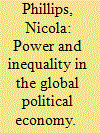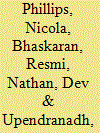| Srl | Item |
| 1 |
ID:
153850


|
|
|
|
|
| Summary/Abstract |
Inequality in all its forms is the defining global problem and increasingly the defining political problem of our age. A monumental body of scholarly research seeks to understand the drivers behind the vast and accelerating patterns of socio-economic inequality in the global political economy. This article, an adapted version of the 2016 Martin Wight Memorial Lecture, contributes to this effort by focusing on a dimension of the picture which has received surprisingly little attention, namely, the implications for socio-economic inequality of the particular form of industrial organization that has come to underpin the contemporary global economy—one organized around global value chains and global production networks. It proposes an approach which sees inequality as arising at the intersections of three dimensions of asymmetry—asymmetries of market power, asymmetries of social power and asymmetries of political power—which underpin and crystallize around global value chains. It explores these dynamics in the particular arena of labour and labour exploitation in global value chains, as a means of shedding a valuable wide-angle beam on the big questions of power and inequality in the contemporary global political economy.
|
|
|
|
|
|
|
|
|
|
|
|
|
|
|
|
| 2 |
ID:
131376


|
|
|
|
|
| Publication |
2014.
|
| Summary/Abstract |
The resilience of the problem of child labour in the global economy has been amply documented, but, we suggest, the reasons for this situation have not yet been fully captured in the associated debates. Our aim is to advance a way of thinking about those forms of child labour which occur in the context of global production networks (gpns), and to contend that greater attention must be paid to the organisation and functioning of gpns, and the social foundations on which they rest, if we are to grasp more fully the conditions and processes which facilitate the persistence and evolution of child labour. The way of thinking we propose is rooted in the concept of 'adverse incorporation' in the global economy, which we develop by drawing together currents in gpn analysis and poverty research to explore the commercial and social dynamics in gpns which give rise to these forms of labour exploitation. We illustrate our arguments with reference to the garments industry in New Delhi, India.
|
|
|
|
|
|
|
|
|
|
|
|
|
|
|
|